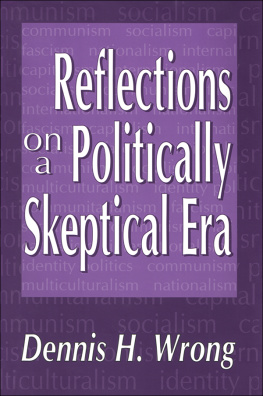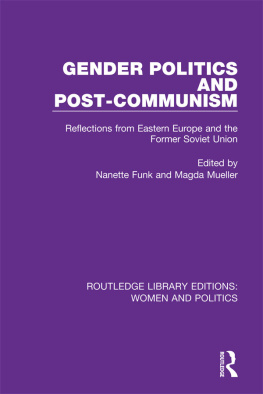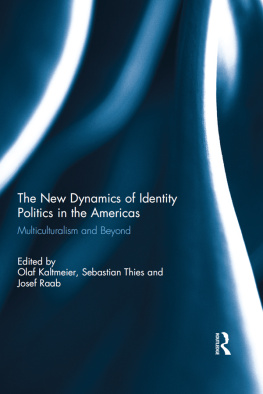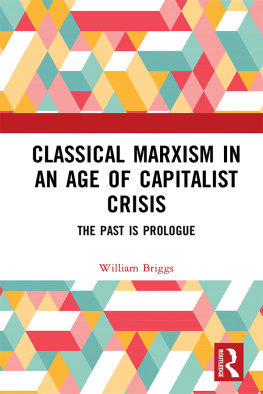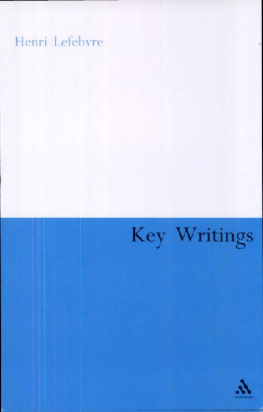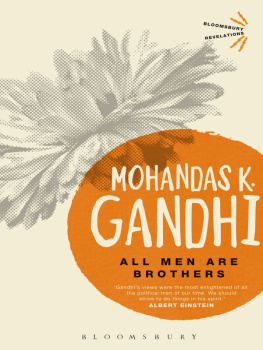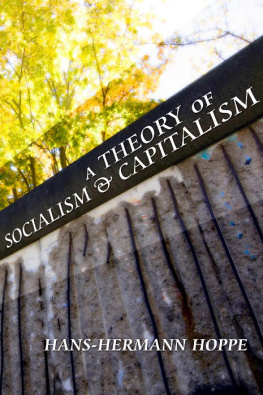Reflections on a Politically Skeptical Era
Reflections on a Politically Skeptical Era
Dennis H. Wrong
First published 2003 by Transaction Publishers
Published 2017 by Routledge
2 Park Square, Milton Park, Abingdon, Oxon OX14 4RN
711 Third Avenue, New York, NY 10017, USA
Routledge is an imprint of the Taylor & Francis Group, an informa business
Copyright 2003 by Taylor & Francis
All rights reserved. No part of this book may be reprinted or reproduced or utilised in any form or by any electronic, mechanical, or other means, now known or hereafter invented, including photocopying and recording, or in any information storage or retrieval system, without permission in writing from the publishers.
Notice:
Product or corporate names may be trademarks or registered trademarks, and are used only for identification and explanation without intent to infringe.
Library of Congress Catalog Number: 2003054134
Library of Congress Cataloging-in-Publication Data
Wrong, Dennis Hume, 1923-
Reflections on a politically skeptical era / Dennis H. Wrong.
p. cm.
Includes bibliographical references and index.
ISBN 0-7658-0195-7 (alk. paper)
1. Political sociology. 2. Political science. I. Title.
JA76.W76 2003
306.2dc21 2003054134
ISBN 13: 978-0-7658-0195-1 (hbk)
Contents
. Reflections on the Death of Socialism: Changing Perceptions of State and Society, Theory and Society, 29 (April 2000), 175-185.
. Is Capitalism Eternal? forthcoming in Critical Review, 15/3 (Fall 2003).
. Inequality and the Division of Labor: the Davis-Moore Theory Re-examined, European Journal of Sociology, 40 (1999), 233-256.
. Economy and Society: The Future, American Journal of Economics and Sociology, 59 (January 2000), 57-60.
. What is Left of the Left? Sociological Forum, 17 (September 2002), 537-543.
. Adversarial identities and Multiculturalism, Society, 37 (January/February 2000), 10-14.
. Diversity: Catchword and Reality, Hedgehog Review, (Spring 2001), 7-23.
. Conscience and Culture: the Moral Sense and Cultural Relativism, expanded version of Conscience and Culture, Dissent, 42 (Winter 1999), 127-130, including unpublished paragraphs.
. Communitarianism, Human Nature, and the Spirit of the Times, in Edward W. Lehman, editor, Autonomy and Order, Lanham, MD: Rowman and Littlefield, 2000, 23-36.
. The Apolitics of Community (in an Era Without Politics), The Responsive Community, 9 (Winter 1998/1999), 32-37.
. Putting Putnams Thesis in its Place, The Responsive Community, 11 (Winter2000/2001), 69-72.
. The Postmodernist Shuffle, American Sociologist, 27 (Fall 1996), 98-102.
. Raymond Aron, Contemporary Sociology, 24 (March 1995), 162-164.
. C. Wright Mills Recalled, Society, 32 (September/ October 2001), 61-64.
. Digby Baltzell: Sociologist and Critical Celebrant of the Upper Class, Sociological Theory, 17 (March 1999), 112-116.
. Etzioni, Socio-Economics, and Human Nature, forthcoming in volume on Etzionis work, edited by Edward W. Lehman, (2003).
. Fated to be a Professor? American Sociologist, 29 (Spring 1998), 7-15.
All of the essays included in the present collection, my third, were written between 1995 and 2001. I originally thought of borrowing the title of one of them for the whole book, calling it reflections on an apolitical era. However, I eventually decided that that title seemed to downgrade the reality and importance of the normal political differences that still divide political parties and citizens in democratic nations that I had no wish to appear to minimize. My generation, reaching adolescence before the Second World War, was doubtless too disposed to believe that politics fundamentally consisted of clashes between totalistic worldviewscommunism or socialism versus capitalism, fascism or communism versus democracy, even nationalism versus internationalism. The two opening essays here on the death of socialism and the likely eternal survival of capitalism certainly reflect this disposition as do several others included in the book. But the era when political ideologies amounted virtually to secular religions may well have been a historically transitory one, or so one today has reason to hope. Hence my eventual preference for politically skeptical over apolitical, which, while still suggestive of the decline of political faith, is less categorical in emphasis. The collapse of the Soviet bloc in 1989-91 marks a useful chronological dividing line between the old and new eras of thinking about political differences.
Multiculturalism and identity politics as well as the communitarianism countering them were all perspectives possessing some, not necessarily primary, political implications that emerged and flourished in the 1990s. I have therefore grouped under these headings those essays of mine that directly or indirectly deal with these themes. The fourth section is more heterogeneous since with the exception of its first chapter (12 in the book) it discusses five quite different individual thinkers. Two of them, Aron and Mills, clearly belong to the earlier age of ideological conflict. Both of them were major influences on me, though, as the title of my first essay collection Skeptical Sociology suggests, my outlook was closer to Arons despite not having known him personally. Charles Lemert, my major exemplar of postmodernism in the second essay in this section, and Amitai Etzioni clearly write on themes resonant of the more recent period. Digby Baltzell, unlike the others, was less a theorist than a chronicler, critic, and defender of the Eastern American upper class into which he had been born; I place the treatment of him here only because it deals with an individual writer.
The fifth and last section consists of autobiographical reports. The piece on the Rosenbergs and McCarthyism was presented last year on a panel at the New School for Social Research in New York City whose other members were the authors of the three recent books it discusses. Since Communism viewed in retrospect is its major topic, it might have been included in the first section, but I placed it here because it deals mainly with my ownremembered experiences of the subject and the time. A few paragraphs from Fated to be a Professor? were included in the autobiographical memoir in my second essay collection, The Modem Condition. This is the only duplicated material in the present volume.
As was true of my two earlier collections, not quite half of the present essays were published in academic sociological journals, one in a journal of philosophy. I should at least like to think that these were as readily accessible to potential readers as the essays that appeared in periodicals aimed at a more general readership, most of them mainly concerned with politics and public affairs. The longest essay here, the third in the book, is the most academic in tone, approach, and citations: its subject has always been a primary one for sociology. Yet analysis of class and social inequality has also been par excellence a sociological topic of wide general interest. Two of the essays here are from anthologies edited by my friend and former NYU colleague, Edward W. Lehman, and were originally presented at conferences he had organized.

